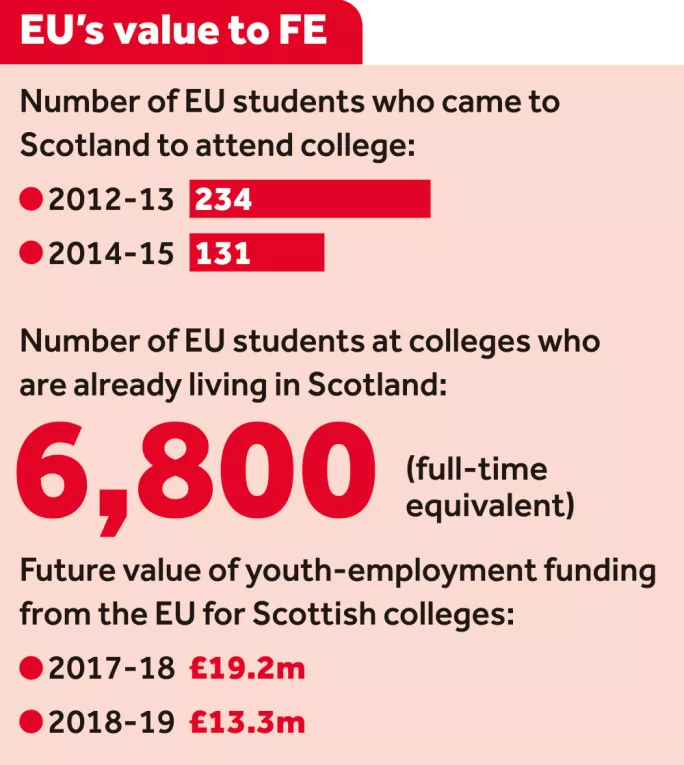Architect of FE reform says EU exit might ‘shrink us’

As Scotland’s future in Europe hangs in the balance, the academic whose work led to an overhaul of the college sector has warned of the dangers of Brexit for further education.
Exiting the European Union would exclude Scottish colleges from vital funding streams and it could create an exodus of overseas students and lecturers, said Professor Russel Griggs, whose 2012 review of further education provided the blueprint for the Scottish government’s subsequent reforms.
The reforms involved college mergers and the creation of 13 college regions, aimed at allowing the sector to work more effectively with other education bodies and employers.
Speaking after addressing a conference in Edinburgh on Brexit, Professor Griggs warned of the “huge implications” for cross-border education schemes, adding that “[colleges] won’t be able to apply for the money, because the money will be all tied up in Europe”.
He said that the “huge amount of uncertainty” affected “surety of staff and knowing that you will be able to still go into the great European market, and that’s the point - nobody knows if we will or not”.
‘We risk losing many financial, cultural and educational benefits that we currently enjoy’
Students and lecturers may well “feel that they have to go to where they came from”, he added.
The former chairman of Dumfries and Galloway College believed European research projects encouraged a “widening of the mind” and was concerned that Brexit might “shrink us to become more insular”.
While the majority of British voters chose to leave the EU in last year’s referendum, about two-thirds of the Scottish electorate voted to remain. Last week, first minister Nicola Sturgeon announced plans to hold a second independence referendum to ensure Scots could decide their own path regarding their relationship with Europe.
After initially saying that the vote had to happen before the UK was due to leave the EU in March 2019, Ms Sturgeon later signalled that she was “up for discussion” with prime minister Theresa May over the date.
According to a document circulated by Colleges Scotland, colleges receive two main sources of European funding that pay for building costs and the delivery of courses. The Developing Scotland’s Workforce and Youth Employment Initiative projects are “significantly funded by the EU” and “make up the bulk of college income derived from the EU”.
This funding is forecast to peak in 2017-18 at £19.2 million before dropping significantly to £13.3 million in 2018-19, as the initiative comes to an end. There is widespread uncertainty over which sources of EU funding would be available to colleges in future.

Fewer non-Scottish students
The document also reveals that the number of students who came to Scotland from the EU to attend college has almost halved in the past three years, from 234 in 2012-13 to 131 in 2014-15. This, it states, is “a result of immigration restriction and the reduction in core funding, which has focused colleges on core delivery to Scottish domiciled students”.
There are 6,800 full-time equivalent Scottish college students from EU countries in total, but they may need to leave Scotland if they are unable to continue their studies due to Brexit, said Shona Struthers, chief executive of Colleges Scotland.
She said: “Scotland’s colleges attract talent and develop projects from across the globe, and we want to maintain our work with our European partners at all levels.”
Colleges Scotland was working with the Scottish government and Scottish Funding Council to ensure that any impact on income for the sector could be addressed, she added.
NUS Scotland president Vonnie Sandlan said Brexit had created a worrying uncertainty over the future status of European students and staff in Scotland’s colleges. The protection of freedom of movement and access to EU educational projects needed to be at the heart of EU negotiations, she added: “Without this, we risk losing many of the financial, cultural and educational benefits that Scottish students and colleges currently enjoy.”
You need a Tes subscription to read this article
Subscribe now to read this article and get other subscriber-only content:
- Unlimited access to all Tes magazine content
- Exclusive subscriber-only stories
- Award-winning email newsletters
Already a subscriber? Log in
You need a subscription to read this article
Subscribe now to read this article and get other subscriber-only content, including:
- Unlimited access to all Tes magazine content
- Exclusive subscriber-only stories
- Award-winning email newsletters